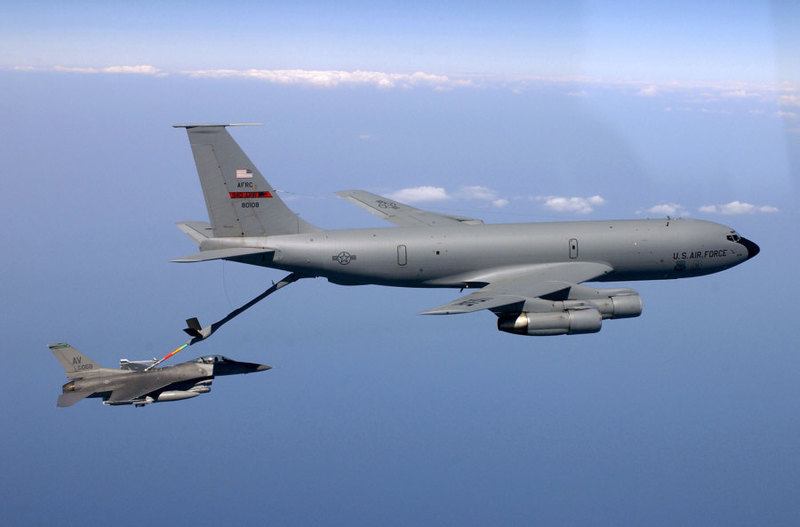The Boeing Company is the world’s largest aerospace company, and the #2 maker of large commercial jets (having fallen behind bitter rival Airbus) and the #2 defense contractor behind Lockheed Martin. Boeing has two major segments: Commercial Airplanes and Integrated Defense Systems. Boeing’s commercial aircraft include the 787 Dreamliner (due in 2008), 767, 747, and the 737; military aircraft include the F/A-18 Hornet, the F-15 Eagle, the C-17 Globemaster III transport, and the AH-64D Apache helicopter. Boeing’s space operations include communications satellites, missiles, the International Space Station, and the Space Shuttle (with Lockheed).
Contents

This controversial Boeing ad depicted U.S. Special Forces troops rappelling from an Osprey aircraft onto the roof of a mosque.
Criticisms
Unethical conduct
In May 2003, the US Air Force announced that it would lease 100 KC-767 tankers to replace the oldest of its KC-135 fleet. Additionally, the 10 year lease would give the Air Force the option to purchase the aircraft at the end of the contract. In September 2003, responding to critics who argued that the lease was vastly more expensive than an outright purchase, the Department of Defense announced a revised lease of 74 aircraft, and a purchase of 26.
Then, in December 2003, the Pentagon announced that the project was to be frozen while allegations of corruption by one if its former procurement staffers, Darleen Druyun (who had moved to Boeing in January) was investigated. The fallout of this resulted in the resignation of Boeing CEO Philip M. Condit and the termination of CFO Michael M. Sears. Harry Stonecipher, former McDonnell Douglas CEO and Boeing COO, replaced Condit.
Druyun later pleaded guilty to inflating the price of the contract to favor her future employer and to passing information on the competing Airbus A330 MRTT bid. In October 2004 she was sentenced to nine months in jail for corruption, fined $5,000, given three years of supervised release and 150 hours of community service.
In March 2005, the Boeing board forced President and CEO Harry Stonecipher to resign. Boeing said an internal investigation revealed a “consensual” relationship between Stonecipher and a female executive that was “inconsistent with Boeing’s Code of Conduct” and “would impair his ability to lead the company”. James A. Bell served as interim CEO (in addition to his normal duties as Boeing’s CFO) until the appointment of Jim McNerney as the new Chairman, President, and CEO on June 30, 2005.
In-Depth
- US: Lockheed, BAE protest Boeing pacts: “Firing the first legal salvos by defense contractors claiming to be victims in a widening Pentagon procurement scandal, Lockheed Martin Corp. and Britain’s BAE Systems PLC filed protests asking the Air Force to review tainted contracts won by rival Boeing Co.”
- US: Boeing’s CEO Steps Down Amid Scandal: “Boeing Co. Chairman and Chief Executive Philip M. Condit unexpectedly resigned Monday, as the world’s largest aerospace company moved quickly to restore an image sullied by scandal.”
Industrial espionage
In June 2003 Lockheed Martin sued Boeing alleging the company had resorted to industrial espionage in 1998 to win the Evolved Expendable Launch Vehicle (EELV) competition. Lockheed alleged that former employee Kenneth Branch, who went to work for McDonnell Douglas and Boeing, passed 25,000 proprietary documents to his new employers. Lockheed argued that these documents allowed Boeing to win 21 of the 28 tendered military satellite launches.
In July 2003 Boeing was penalized, with the Pentagon stripping $1 billion worth of contracts away from the company and awarding them to Lockheed. Furthermore, the company was forbidden to bid for rocket contracts for a twenty-month period which expired in March 2005.
In early September 2005 it was reported that Boeing was negotiating a settlement with the U.S. Department of Justice in which it would pay up to $500 million to cover this and the Darleen Druyun scandal.[5]
- US: Boeing Punished for Stolen Data: “The Air Force stripped Boeing Co. of $ 1 billion in potential revenue as a penalty for possessing documents stolen from Lockheed Martin Corp. during a competition for a large contract to launch military satellites.”
- US: Probe of Boeing, Documents Expanded: “A criminal investigation into whether Boeing Co. used stolen Lockheed Martin Corp. documents to win an Air Force contract has grown to include an examination of NASA contract competitions, sources close to the inquiry said yesterday.”
Airbus subsidy dispute
In October 2004, Boeing filed a complaint at the World Trade Organization, claiming that Airbus had violated a 1992 bilateral accord when it received what Boeing deems as “unfair” subsidies from several European governments. Airbus retaliated by filing another complaint, contesting that Boeing had also violated the accord when it received tax breaks from the U.S. Government. Moreover, the E.U. also complained that the investment subsidies from Japanese airlines violated the accord.
On January 11, 2005 the two parties (Boeing and Airbus) agreed that they would attempt to find a solution to the dispute outside of the WTO.
However, in June 2005, Boeing and the United States government reopened the trade dispute with the WTO, claiming that Airbus had received illegal subsidies from European governments. Airbus has also retaliated against Boeing, reopening the dispute and also accusing Boeing of receiving subsidies from the US government.
‘Extraordinary rendition’ flights for terrorism suspects
- Outsourcing the CIA’s Travel Agent: Boeing subsidiary Jeppesen International Trip Planning works with the CIA to secretly transport terrorism suspects to detention centers in what some critics see as an “illegal means of ‘outsourcing torture,'” according to an Oct. 30, 2006 article in the New Yorker. In the article, a former Jeppesen employee recounts a comment made by Managing Director Bob Overby in a internal corporate meeting: “We do all of the extraordinary rendition flights — you know, the torture flights. Let’s face it, some of these flights end up that way.”
- Jeppesen handles “many of the logistical and navigational details for these trips, including flight plans, clearance to fly over other countries, hotel reservations and ground-crew arrangements,” according to the New Yorker article.
Political Influence & Influence Peddling
- Boeing Influence Peddling: “Aside from 747s, Boeing makes “smart” bombs, F-15 fighters, and Apache helicopters. Boeing has paid tens of millions in fines for selling flawed parts that led to thousands of unnecessary landings and at least one fatal crash and has been plagued by scandals connected to the company’s influence-peddling.”
- Boeing Scandal Part of Deeper Problems at Pentagon: “Darleen Druyun, former weapons buyer for the U.S. Air Force, checked into a special women’s prison about 50 miles from the Gulf of Mexico in the heart of Florida’s Panhandle region this week, for a nine month stay, after pleading guilty to giving Boeing special treatment on an $23.5 billion government contract.”
- US: Boeing’s Skillful Lobbying Efforts: “In a June day this year, just over 50 executives from the Boeing Company trooped into Room 405 upstairs in the Old Executive Office building adjacent to the White House. From the podium where George W. Bush often hosts visiting groups, Karl Rove, the president’s chief political strategist, briefed the Boeing managers on the administration’s agenda and how it overlapped with Boeing’s concerns.”
Advertising
- US: Magazine ad “unleashes hell” for Boeing and Bell: “Boeing and its joint-venture partner Bell Helicopter apologized yesterday for a magazine ad published a month ago – and again this week by mistake – depicting U.S. Special Forces troops rappelling from an Osprey aircraft onto the roof of a mosque.”







